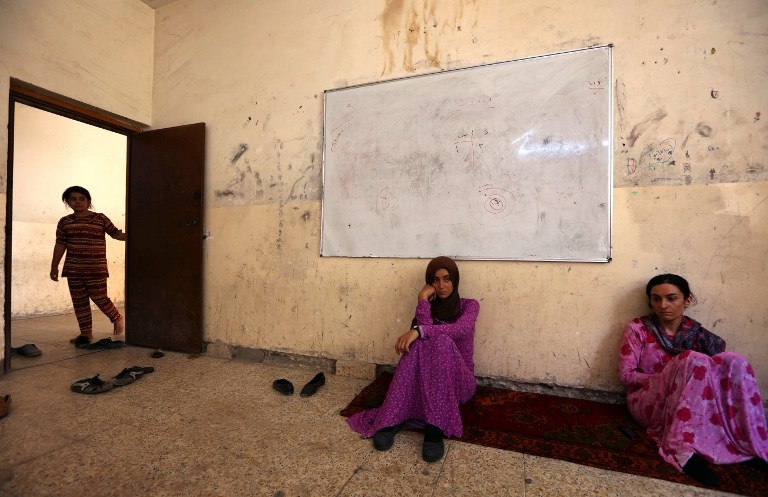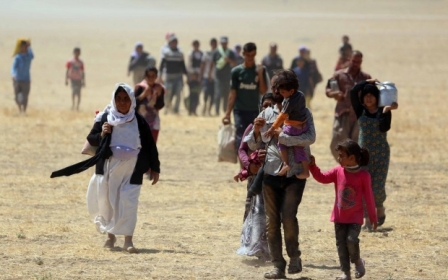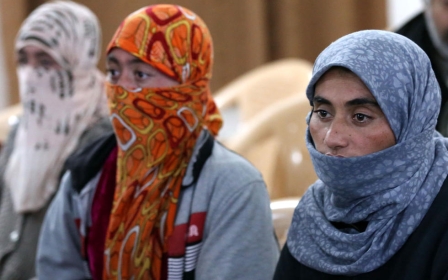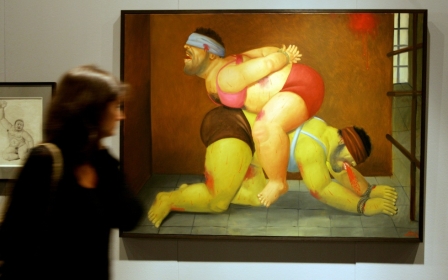Impregnated, brainwashed and broken: The misery of IS sex slaves

UNITED NATIONS - “Whether you like it or not, the moment I had sex with you, you became a Muslim,” were the words of one Islamic State (IS) fighter to an enslaved Iraqi women as she endured a nightmare of sex abuse and mental cruelty.
The militant’s comments were relayed to Jacqueline Isaac, a charity boss, who has met dozens of rescued Yazidis, Turkmen and Christians during three visits to northern Iraq’s autonomous Kurdish zone these past seven months.
Isaac visited UN headquarters this week to recount the mental and physical torture, forced conversions and unhappy pregnancies suffered by IS sex slaves. She has now called for a UN-led task force to keep track captives and help set them free.
“These people are barbaric,” Isaac, an Egyptian-American and vice president of the Roads of Success charity, told Middle East Eye.
“They intend to destroy, enslave and brainwash these women, take over their bodies and their souls to the point where they are even forced to draw their own blood so it can be used in transfusions on wounded soldiers.”
She recently met 70 escaped Yazidi women in Dohuk who all told similar stories of IS soldiers storming their homes after midnight in Sinjar last August, killing men and loading women onto trucks that drove them to a “sorting centre” in IS-held Mosul.
Girls aged under five were freed; those over 25 were sent to Syria. The rest were rated on their prettiness, tested for virginity and divvied up between IS warriors from the blitzkrieg assault across northern Iraq last year, she said.
Some fighters spoke with American, German and Russian accents, she said. Women were raped repeatedly for days before being traded in slave auctions – often in converted school classrooms – to become another fighter’s “property”.
According to Isaac, slaves endured beatings, consecutive rapists, unwanted pregnancies and conversion to Islam. The goal, she said, was to break their spirits so they would become compliant mothers to children of the Islamic caliphate.
It did not always work, she said. Some women killed themselves rather than abandon their faith; the lucky ones escaped.
“IS considers Yazidis devil-worshippers and fair game to do whatever they want with,” Isaac told MEE.
“They take Yazidi girls, break them down, indoctrinate them,” she said. “They want to see … Yazidis vanish completely. If the girl refuses, the torture and abuse increases. Some die trying to escape.”
One year since Mosul fell to the militants, the true number of those rounded up in the IS advance remains unclear. Estimates vary from 3-5,000 captives. According to Isaac, Kurdish officials care for 1,270 people who have escaped from IS clutches.
Isaac’s revelations adds to evidence from Zainab Bangura, the UN envoy on sexual violence in conflict, who told MEE last month how IS is “institutionalising sexual violence” with widespread rape after her own visit to the region.
According to Bangura, one woman was traded 22 times; another had a sheikh’s name inscribed on her hand to mark his property. A Saudi fighter set alight a 20-year-old Yazidi slave after she refused to perform “extreme sexual acts” with him, she said.
The US leads a coalition of states carrying out airstrikes on IS targets, while Kurdish, Iraqi and other forces battle them on the ground. On Wednesday, US President Barack Obama announced plans to deploy 450 more American non-combat troops to Iraq.
But for Isaac, military tactics are not enough. During meetings with UN ambassadors this week, she called for a UN task force to establish official numbers of enslaved women and advance efforts to free and buy back IS captives.
“The United Nations was created for a crisis like this. It’s our time to stand and ask the international community to help rescue our girls that are still in the hands of IS today,” she told MEE.
New MEE newsletter: Jerusalem Dispatch
Sign up to get the latest insights and analysis on Israel-Palestine, alongside Turkey Unpacked and other MEE newsletters
Middle East Eye delivers independent and unrivalled coverage and analysis of the Middle East, North Africa and beyond. To learn more about republishing this content and the associated fees, please fill out this form. More about MEE can be found here.




